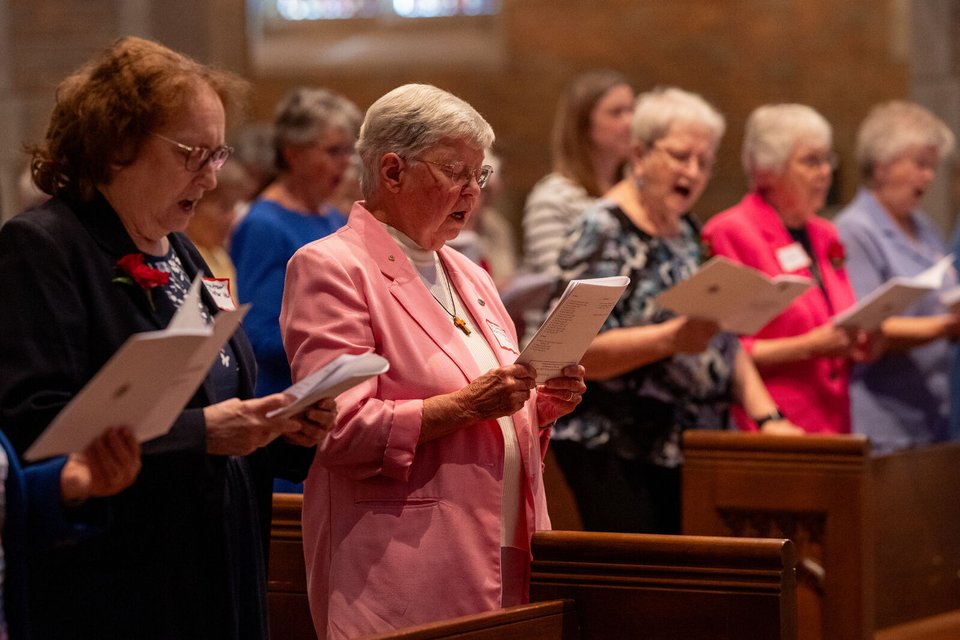Bishop Lewandowski encourages Felicians to be 'bearers of the Word to the world' as community finishes yearlong celebration
LIVONIA — The Felician community and its supporters gathered Nov. 21 at the Presentation of the Blessed Virgin Mary Chapel in Livonia to conclude a yearlong celebration of 150 years of ministry in North America.
Throughout the year, the Congregation of Sisters of St. Felix of Cantalice Third Order Regular of St. Francis of Assisi — commonly known as the Felician Sisters — has held celebrations and events to commemorate the impact of the Felicians on the Church, inspired by the order's founder, Blessed Mary Angela Truszkowska, who founded the Felicians in Warsaw, Poland in 1855.
The sisters began their 150th anniversary celebration at the chapel last year, so it was a fitting place to conclude the celebration, said Sr. Judith Marie Kubicki, CSSF.
“We wanted to conclude where it started, and so the decision was made by the people planning all these celebrations that (Livonia) would be a fitting place to end our journey,” Sr. Kubicki told Detroit Catholic.

In October 1874, Blessed Angela sent five sisters to North America at the request of Fr. Joseph Dabrowski to serve the growing Polish immigrant community in the United States.
The Felicians first arrived in Polonia, Wisconsin, on Nov. 21, 1874. The group then moved to Detroit in 1882, establishing their first motherhouse across from St. Albertus Parish.
In 1936, the Felicians moved to Livonia, building a new campus. The chapel itself was completed in 1961.
It was in that chapel that Bishop Bruce A. Lewandowski, CSsR, of Providence, Rhode Island, encouraged the sisters and those gathered Nov. 21 to think of all those who have prayed in the chapel and the abundant graces that stemmed from those prayers.
Don't miss another story
Did you know you can get Detroit Catholic's latest articles delivered to your inbox? It's easy and free to sign up!
Mother Angela was demanding of her sisters, Bishop Lewandowski said, but she was so because she knew the tremendous burden they carried in proclaiming the Gospel through word and deed.
“Mother Angela wanted her sisters to be zealots, fervent exemplars for others to follow,” Bishop Lewandowski said in his homily. “I don’t know if she was aware of it, but she was in a way, writing a fifth Gospel, very much aware that how she was living the Gospel, how her sisters were living the Gospel, would be a witness to people around the country.”
Bishop Lewandowski said Mother Angela and the Felician Sisters understood that they were to “carry the Word in the world,” and by doing so, they would set an example for both future sisters and the faithful.

“I wonder how many times she prayed, ‘O Lord, may the ones who come behind us find us fervent,'” Bishop Lewandowski said. “In her writing, she knew one day we’d be sitting here, looking back at her legacy, the legacy of the Felician Sisters who came before us. And she knew we’d be looking back at their lives and what they modeled for us, and we’d be asking what they are asking of us today.”
Bishop Lewandowski highlighted the ways the Felicians have been “bearers of the Word into the world” for 150 years, from teaching in school, nursing in hospitals, standing for the rights of immigrants and advocating for the marginalized.
There are times when the weight of the Word becomes heavy, Bishop Lewandowski acknowledged, and that is when the Felician Sisters’ community comes in to support the mission.
“You carry the Word because you know it has value and worth, but sometimes, heavy things are hard to carry,” Bishop Lewandowski said. “Sometimes, trying to live the Gospel can feel heavy. Trying to be kind, compassionate, loving, and forgiving can feel heavy. But that is what community is for, that none of us carries the Word alone.

“Sisters, when the Word gets too weighty for you, call on your sisters, call on your associates; they are there when it gets too heavy to carry it into the world,” Bishop Lewandowski added. “May all who come behind you be inspired. May all who come after you find you faithful, ready and willing to be bearers of the Word into the world.”
While the Felicians have accomplished much over 150 years, the community's many ministries continue to evolve to meet the needs of the faithful today, Sr. Kubicki said.
“Focusing on Mother Angela and her legacy gives us a chance to review and reflect on our charism, our mission, our vision, and see and reinterpret it for a new time,” Sr. Kubicki said. “When we first started in North America, we were called to serve the Polish immigrants, who needed schools and hospitals. Today, we’re engaging in activities in the neighborhoods and parishes, caring for the sick, working with immigrants, and protecting the environment. The ministries may change, but the mission remains.”
Copy Permalink
Felician Sisters Consecrated life











